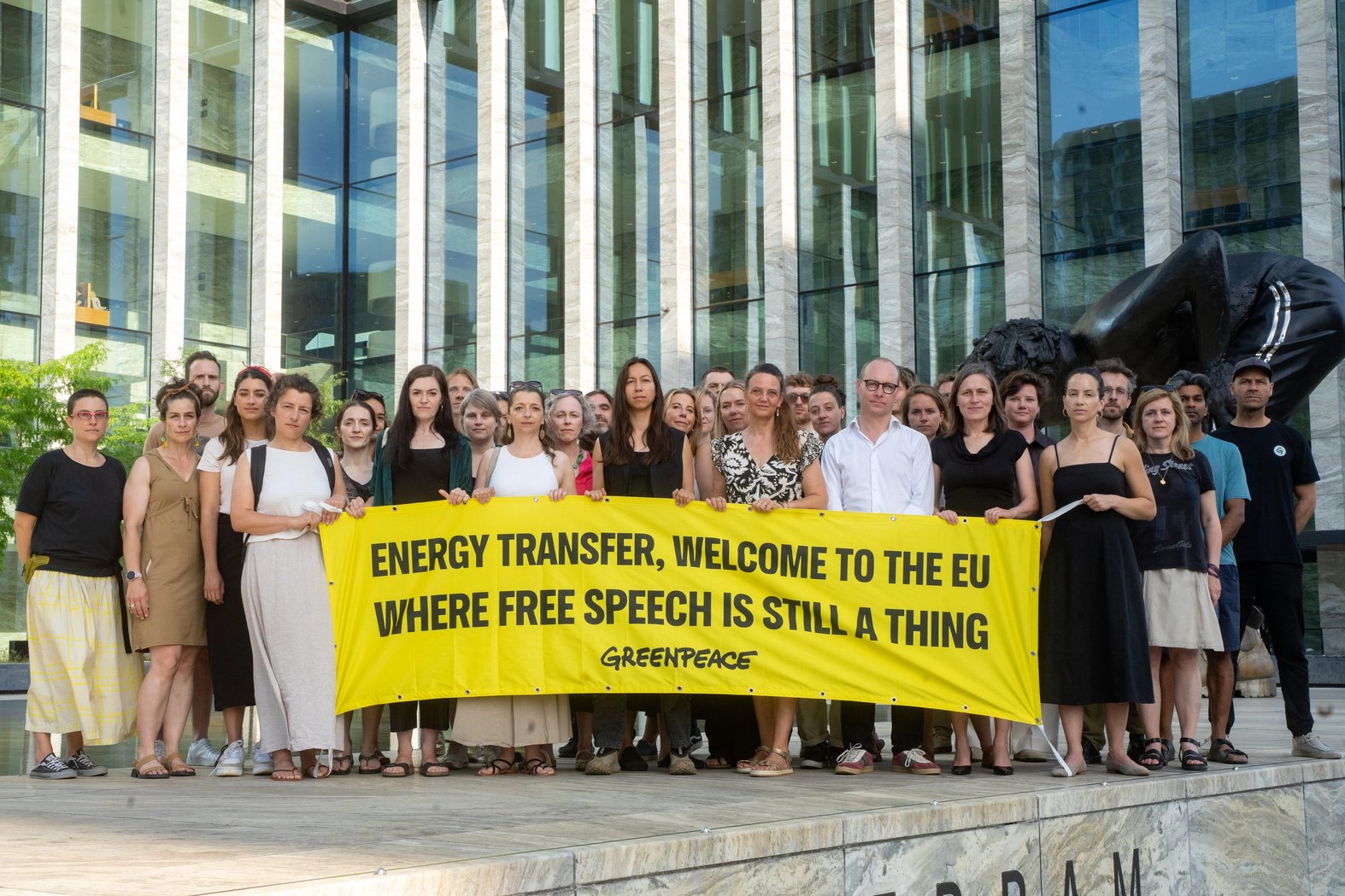
Photo: People gather outside the New Amsterdam Courthouse holding a banner reading "Energy Transfer, Welcome To The EU Where Free Speech Is Still A Thing" to mark the beginning of Greenpeace International's anti-SLAPP lawsuit against fossil fuel pipeline company Energy Transfer filed in Amsterdam, The Netherlands. © Tengbeh Kamara / Greenpeace
Today marked the formal start of a test case for the European Union’s new anti-SLAPP law protecting free speech. Greenpeace International, which is headquartered in Amsterdam, challenged Energy Transfer—the oil company behind the Dakota Access Pipeline (DAPL)—over its lawsuit against the environmental advocacy group in the U.S. that recently ended in a whopping $666 million judgement.
In March 2025, a jury in North Dakota delivered the judgment against Greenpeace International and its U.S. entities, buying Energy Transfer’s story that the environmental group coordinated the Standing Rock protests in 2016 despite scant evidence. The trial took place in the town where the protests unfolded and over half the jury had ties to the dominant fossil fuel industry in North Dakota.
SLAPP (Strategic Lawsuits Against Public Participation) lawsuits are legal threats or actions taken by a private party to silence legitimate criticism and to levy a price for speaking out: staggering legal fees and the emotional toll of litigation.
“The process is the purpose,” said Betsy Apple, executive director of Global Climate Legal Defense Fund. “The whole point of a SLAPP is a war of attrition.”
Also known as privatized censorship, SLAPP suits have become an increasingly common way to use the courts to punish dissent. Greenpeace and its various subsidiaries all over the world are frequent targets of such suits. In recent years, oil majors Shell, Total, and ENI have filed SLAPPs against Greenpeace entities.
The European Commission—the executive arm of the European Union – adopted a new directive against SLAPP suits in 2024. Journalists and public watchdogs, including environmental groups, in Europe have faced increasing SLAPP suits in recent years. Before her car bomb assassination in 2017, Maltese investigative journalist Daphne Caruana Galizia faced more than 40 civil and criminal libel lawsuits, some of which her family is still fighting. Her murder helped spur European advocacy groups to document the growing trend of SLAPP suits and to push for broader legal protection against them. Anti-SLAPP laws give those who are the targets of such suits the ability to quickly appeal them, thereby blunting their impact.
A critical element of the European Directive “creates a new special ground of jurisdiction” to shield claimants against judgments in third-party countries. Just as U.S. companies often opt to file suits in states without an anti-SLAPP law, global companies are increasingly looking to bring legal action against their opponents in jurisdictions most likely to be friendly to them, which means SLAPP suits can be filed far and wide. One SLAPP suit against Caruana Galizia, for example, was filed in Arizona and sought $40 million in damages.
Though cross-border cases typically make up a minor share of SLAPP suits, the European Directive takes a broader view. According to a report from the Coalition Against SLAPPs in Europe (CASE) and the Daphne Caruana Galizia Foundation, where a matter of public participation or public interest has “significance” for more than one EU member state, the matter still falls under the purview of the Directive as a cross-border case, even if both parties are domiciled in the same country.
Few cross-border cases, however, also cross oceans. Greenpeace International is invoking Article 17 to demand compensation for the enormous costs incurred fighting Energy Transfer’s litigation in the U.S.
“It’s a huge landmark, said Apple. “It’s a test case of whether Dutch law in light of this Directive is capable of protecting civil society actors in Europe from U.S. judicial weaponization.”
Under a related article, the Directive allows EU member states to refuse to enforce judgments against SLAPP targets in courts outside of the EU as contrary to public policy. With no final judgment still in the North Dakota case, Greenpeace International has not invoked this article in its anti-SLAPP challenge, but it remains an option as both cases progress.
Yet even if Greenpeace International prevails in the Dutch court, Greenpeace USA and the Greenpeace Fund can only hope for their appeals in the U.S. court system to succeed.
“The EU directive cannot and will not apply to these U.S. entities,” Apple explained. “If [Greenpeace USA and the Greenpeace fund] are unable to get a positive outcome from U.S. courts, they don’t have any other place to go to seek to essentially erase this judgment if they lose at the final stage. And that’s just a fact of jurisdictional differences and, frankly, judicial and legislative values.”
Though a majority of U.S. states have protections against SLAPP lawsuits, Energy Transfer brought its case against Greenpeace USA, Greenpeace Fund, and Greenpeace International in North Dakota, one of 12 states without an anti-SLAPP law.
“In this case, Energy Transfer hit the jackpot because they both succeeded in an attenuated, expensive process and a monumentally expensive outcome,” Apple said.
Energy Transfer accused the three Greenpeace entities of “conspiring” to defame the company and interfere with its business by orchestrating the months-long protest against DAPL in 2016. The claim erases the organic movement led by Indigenous groups, namely the Standing Rock Sioux Tribe. The protests drew worldwide attention and delayed the pipeline’s installation under the Missouri River on contested territory. In the aftermath, the company’s CEO, Kelcy Warren made no secret of his antipathy for Greenpeace and other environmental groups, warning that “what they did to us is wrong and they’re going to pay for it.” Warren later joked that environmental activists “[need] to be removed from the gene pool.”
In the wake of the protests, Energy Transfer filed a federal racketeering case against Greenpeace, invoking the 1970 Racketeer Influence and Corrupt Organizations (RICO) law passed to target organized crime. The case was dismissed for lack of evidence, but Energy Transfer refiled it in state court, ditching some of the more lurid allegations but still arguing the same fundamental theory, accusing Greenpeace of an “extremist agenda” to take down the oil company. The heart of this agenda, the lawsuit argued, was a “misinformation campaign” seeking to defame Energy Transfer as well as a $15,000 payment by Greenpeace USA to an Indigenous activist group (at their request) to support nonviolent direct action training. Energy Transfer argued it had suffered over $200 million in damages as a result of the protests, though the pipeline was ultimately finished in 2017 and the company earned over $40 billion in profits that year.
The lawsuit also argued “tortious interference,” accusing Greenpeace of delaying or blocking financing of the Dakota Access Pipeline. The evidence to back up this claim was a single letter, written and organized by a different nonprofit, BankTrack, but signed by Greenpeace International, along with 500 other organizations, in November 2016. The letter urged the 17 banks financing DAPL to halt its remaining loan payments. This letter was the sole piece of documentation of Greenpeace International’s involvement in this campaign that Energy Transfer was able to produce.
The parallel cases set important and diametrically opposite precedents. In the U.S., corporations are expanding the legal definition of “corporate free speech” and what it protects them against, while simultaneously punishing their critics for their speech.
“I think we’re far behind in understanding the negative impact of SLAPPs on democracy and democratic resilience in the U.S., and there’s a far more sophisticated and mature understanding of what threat SLAPPs pose to democracy in Europe,” Apple commented.
With the European case, Greenpeace International aims to recoup the enormous sums it has spent fighting Energy Transfer’s SLAPP suit, and to send a defiant message—even if it falls on increasingly deaf ears in the U.S.

